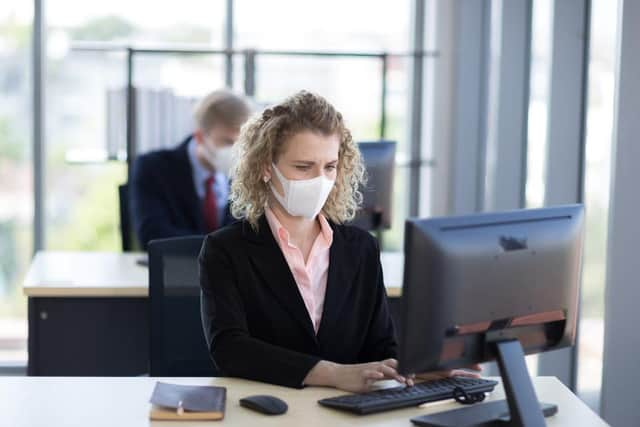When will offices reopen? Date non-essential offices can open Scotland - and what safety measures may be in place
First Minister Nicola Sturgeon has announced the next steps in Scotland’s lockdown exit plan, with a number of measures to be relaxed in the coming weeks.
Ms Sturgeon confirmed on 20 August that Scotland will continue remain in phase three of its four-stage lockdown plan, but outlines several dates for further reopening of business.
Advertisement
Hide AdAdvertisement
Hide AdBut what do the updates say about returning to offices? Here’s what you need to know.


When can office workers return to workplaces?
Since lockdown was imposed in March, the Scottish government has advised workers to work from home, rather than their usual workplace, wherever possible.
This guidance has not yet changed, with home working and flexible working still being recommended a the default position for workers.
Ms Sturgeon said that non-essential offices should remain closed until at least 14 September, or possibly later than this date depending on the current coronavirus infection rates.
However, she added that even then, working from home and working flexibly “will remain the default position” for workers in Scotland.
The First Minister said she was not currently able to announce a date when workers can return to non-essential offices and call centres.
Speaking at the latest Government review on 20 August, she said: "For now, working from home will remain the default position.
“I am acutely aware of the impact of home working on services, such as cafes and restaurants, which are based in areas with lots of office workers.
Advertisement
Hide AdAdvertisement
Hide Ad"However a full return to office working, given the numbers involved, would significantly increase the risk of indoor transmission. It would also make buses and trains significantly busier and increase transmission risks there too.
“Our conclusion therefore is that a return to working in offices, unless that work is essential and cannot be completed at home, presents too great a risk at this time.”
What safety measures will be in place?
The government has issued guidance for various business sectors regarding what measures will need to be implemented to allow people to return to physical workplaces safely.
Employers and employees have been advised to discuss their working arrangements, with employers urged to take every possible step to facilitate their employees working from home. This includes providing suitable IT and equipment to enable remote working.
Employers who have staff in their offices or onsite must take all reasonable measures to ensure that employees are able to maintain a two metre distance from each other at all times.
Workers should also frequently wash their hands, for at least 20 seconds each time, and use hand sanitiser where soap and water is not available.
While remote working should remain the default position for those who can, where this is not possible, businesses have been encouraged to manage travel demand through staggered start times and flexible working patterns.
When did Scotland enter phase 3?
Scotland entered phase three of its lockdown exit plan on 9 July, after which a number of relaxation to rules came into effect.
Advertisement
Hide AdAdvertisement
Hide AdThis included the reopening of several businesses throughout July, including pubs, restaurants, indoor shops and hairdressers.
Rules around gatherings with family and friends were also relaxed, allowing people to meet up to 15 people from five different households outdoors, and up to eight people from three different households indoors. Overnight stays are now also permitted.
At the Scottish Government’s latest review on 20 August, the First Minister confirmed that Scotland will remain in phase three and any further relaxations to rules will only be made should the government consider it safe to do so.